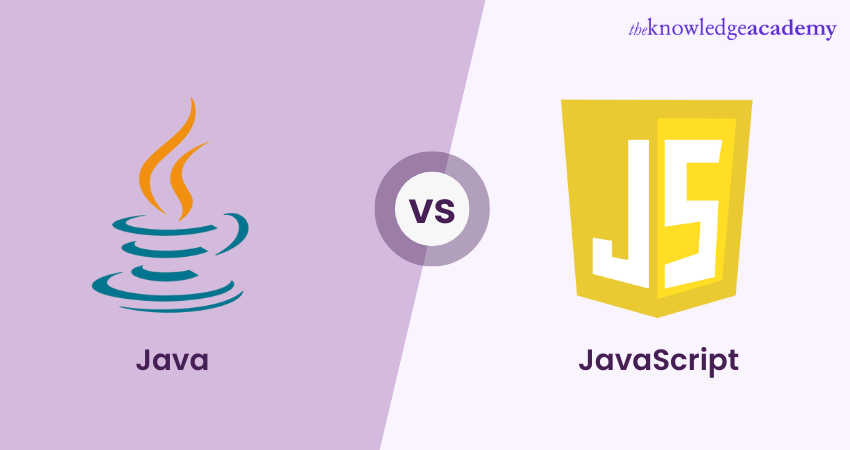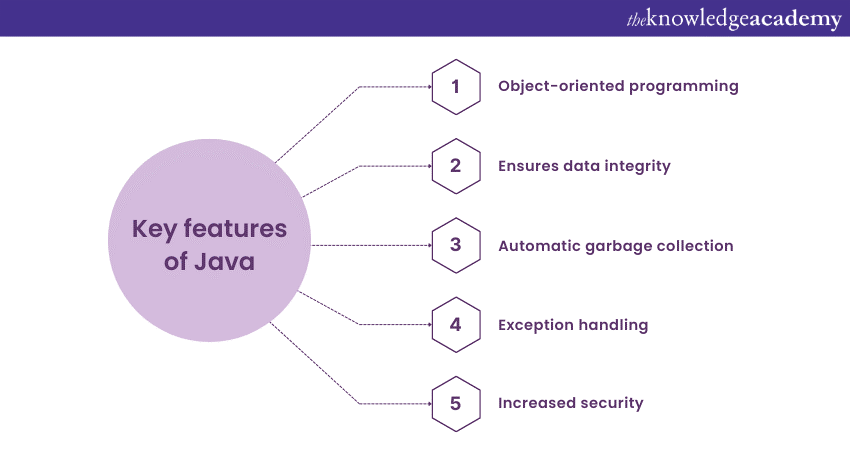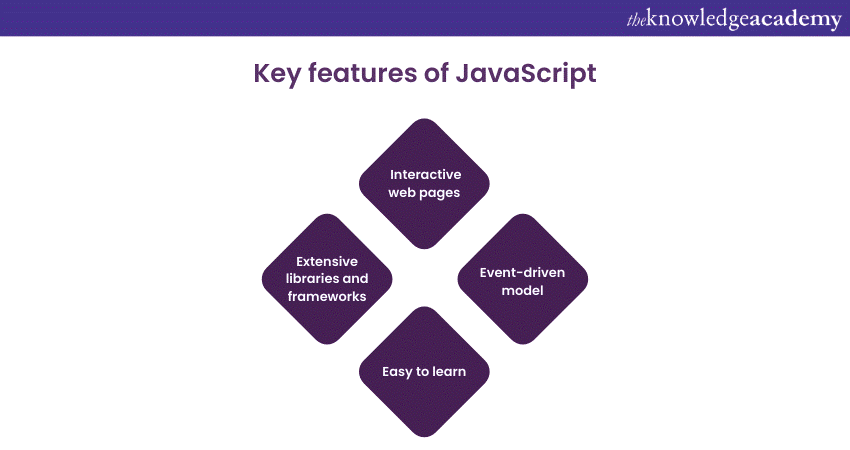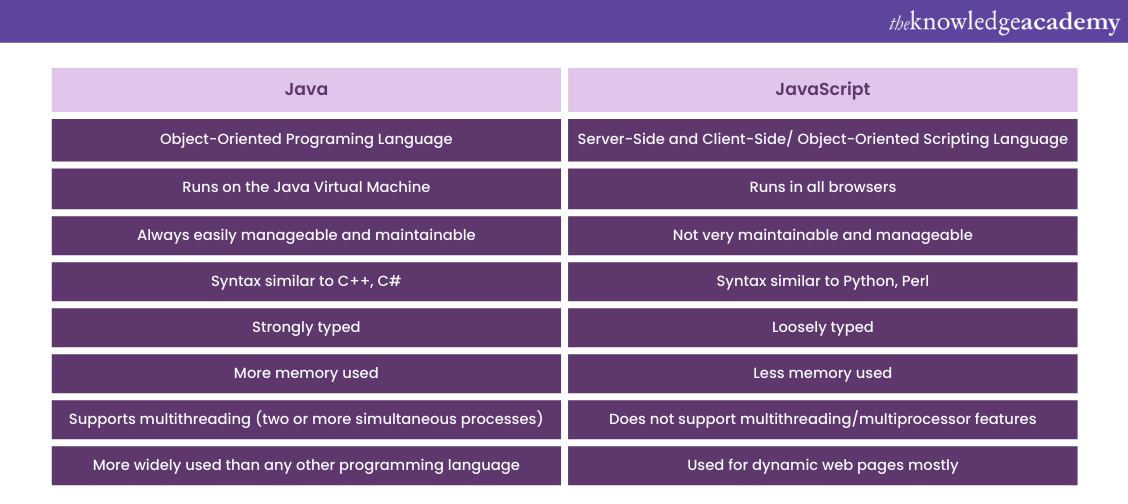We may not have the course you’re looking for. If you enquire or give us a call on +91-181-5047001 and speak to our training experts, we may still be able to help with your training requirements.
Training Outcomes Within Your Budget!
We ensure quality, budget-alignment, and timely delivery by our expert instructors.

Java and JavaScript are distinct programming languages with different applications. Being aware of the Difference Between Java and JavaScript is paramount for informed language selection in development projects.
Java offers versatility and platform independence, while JavaScript enhances interactivity on web pages. According to Statista, JavaScript is the most used programming language (used by more than 65 per cent of developers). In contrast, Java is used by 30% of developers worldwide.
These trends show the use of each programming language, but they do not define the positives and negatives of the two. In this blog, you examine Java and JavaScript, their key features, as well as learn what is the Difference Between Java and JavaScript.
Table of Contents
1) What is Java?
2) What is JavaScript?
3) Comparing Java and JavaScript
a) Syntax
b) Purpose
c) Object-Oriented Programming (OOP) Paradigm
d) Execution environment
e) Memory management
4) Conclusion
What is Java?
Java is a sophisticated, general-purpose language for programming, initially developed by Sun Microsystems in the mid-1990s. It is known for its platform independence, as it can run on various operating systems and devices. It follows the motto of "write once, run anywhere," making it highly versatile and widely adopted in the software development industry.
Key features of Java
Java offers a range of key features to developers that contribute to its popularity. These features also make it a preferred choice for various applications. Let's explore some of the key features of Java:

1) Object-oriented: Java is based on the Object Oriented Programming Paradigm, which emphasises using objects to represent data and behaviour.
2) Strongly typed: Java enforces strict type checking, ensuring data integrity and preventing common programming errors.
3) Garbage collection: It incorporates automatic garbage collection, relieving developers from manual memory management.
4) Robust and secure: This programming language also provides built-in mechanisms for error handling, exception handling, and security, making it suitable for developing robust and secure applications.
Elevate your Java skills and unlock new opportunities in software development with our comprehensive Java Training – Sign up now!
What is JavaScript?
JavaScript or JS, is a lightweight, interpreted scripting language that was initially developed for web development. It runs on the client side, directly in the user's browser, enhancing the interactivity and dynamic behaviour of web pages. Here's how JavaScript helps developers:
a) Manipulate HTML elements
b) Handle events
c.) Create interactive web applications
Key features of JavaScript
JavaScript is a versatile and widely used programming language that empowers developers to create dynamic and interactive web experiences. It provides various key features that make it an essential tool for web development. Let's explore some of the key features of JavaScript:

1) Interactivity: JavaScript enables the creation of dynamic and interactive web pages, allowing real-time updates and user interactions.
2) Event-driven programming: It follows an event-driven model, where actions are triggered by events like button clicks or form submissions.
3) Lightweight and flexible: JavaScript is designed to be lightweight and easy to learn, allowing developers to add functionality to web pages quickly.
4) Extensibility: It can be extended with libraries and frameworks like React, Angular, and Node.js, expanding its capabilities beyond traditional web development.
Discover the power of JavaScript and bring your web development projects to life with our JavaScript For Beginners Course – Sign up now!
Comparing Java and JavaScript
Java and JavaScript are two popular languages for programming, but they have distinct differences in terms of their purpose, syntax, and application areas. Understanding the key Difference Between Java and JavaScript is crucial when it comes to selecting one between these two. Here, we will compare Java vs JavaScript to provide a better understanding of their characteristics and uses:

1. Syntax
One of the main differences between Java and JavaScript lies in their syntax. Java uses a curly brace syntax, similar to other C-based languages like C++ and C#.
On the other hand, JavaScript has a more lightweight and flexible syntax, making it easier to write and read. The ECMAScript specification influences JavaScript's syntax, which defines the language's standards and features.
2. Purpose
Java is essentially designed for developing enterprise applications. Java code can run on various platforms without modification. It is known for its robustness, scalability, and extensive libraries and frameworks, making it suitable for building large-scale applications.
JavaScript, on the other hand, is primarily a scripting language used for enhancing interactivity and dynamic behaviour on web pages. It is mainly used in web development to create interactive elements, handle events, and manipulate HTML elements. JavaScript is executed directly in the user's web browser, enabling real-time updates and user interactions.
3. Object-Oriented Programming (OOP) Paradigm
Java is a pure OOP language, meaning that everything in Java is treated as an object. It follows the concepts of classes, objects, inheritance, and polymorphism, essential in OOP.
JavaScript, on the other hand, supports both procedural and Object-Oriented Programming Paradigms. It allows developers to use objects, but it also supports functional programming and procedural programming styles.
Level up your Java skills and learn how to tackle complex software development challenges with our Java Engineer Training – Sign up now!
4. Execution environment
Java requires a virtual machine called the Java Virtual Machine (JVM) to execute programs. The JVM provides a platform-independent runtime environment that interprets and executes Java bytecode. This allows Java programs to run on different operating systems and devices.
On the other hand, JavaScript runs directly in the user's web browser. Every modern web browser has a JavaScript engine that interprets and executes JavaScript code.
5. Memory management
In terms of memory management, Java and JavaScript employ different approaches. Java uses automatic memory management through a process called Garbage Collection. The JVM automatically deallocates memory that is no longer in use, freeing developers from manual memory management.
JavaScript also uses automatic Garbage Collection but with a different mechanism optimised for web environments. JavaScript engines use algorithms like mark-and-sweep or generational garbage collection to manage memory.
6. Libraries and frameworks
Both Java and JavaScript have a rich ecosystem of libraries and frameworks that enhance their capabilities. Java has a broad collection of libraries and frameworks for different domains, such as:
1) Enterprise development
2) Scientific computing
3) Data analysis
Some popular Java frameworks include Spring, Hibernate, and Apache Struts. JavaScript, being primarily used for web development, has numerous libraries and frameworks tailored for that purpose. Popular JavaScript libraries and frameworks include React, Angular, and Vue.js.
7. Scalability and complexity
Java is known for its ability to handle large-scale applications with complex requirements. It is often used for enterprise-level development where scalability and robustness are crucial. On the other hand, JavaScript is more commonly used for smaller-scale applications, especially for web development projects.
8. Compilation vs interpretation
Java is a compiled language, meaning the source code is translated into bytecode by the compiler and then executed by the JVM. This compilation process ensures higher performance and optimised execution.
JavaScript, on the other hand, is an interpreted language. The JavaScript code is executed directly without a separate compilation step, which makes it more flexible for quick development and prototyping.
9. Static typing vs dynamic typing
It is a statically typed language, so the variables must have a declared type, and the type checking is performed at compile-time. This helps catch potential type-related errors early in the development process.
JavaScript, on the other hand, is dynamically typed. Variables can hold values of any type, and type checking is performed at runtime. This flexibility allows for more rapid development but can lead to certain type-related errors being discovered at runtime.
10. Concurrency and multithreading
Java has built-in support for multithreading and concurrency. It offers a rich set of tools and libraries for creating and managing threads. As a result, it allows developers to write concurrent programs that can perform several tasks simultaneously.
JavaScript, on the other hand, is primarily single-threaded. It follows an event-driven model and relies on callback functions and asynchronous programming techniques to handle concurrent operations.

11. Usage outside the web
While JavaScript is mainly associated with web development, it has extended its reach beyond the browser. With the rise of platforms, languages like JavaScript and Node.js can now be used for server-side development. This creates scalable and high-performance web applications.
On the other hand, Java has a broader range of applications outside the web. It is used for desktop applications, mobile app development (Android), scientific computing, financial systems, and more.
12. Tooling and development environment
Java has a mature ecosystem with a wide range of development tools, Integrated Development Environments (IDEs), and build systems. Popular Java IDEs include Eclipse, IntelliJ IDEA, and NetBeans.
JavaScript also has a robust set of tools and frameworks for web development, including code editors like Visual Studio Code and Atom. The JavaScript ecosystem benefits from the popularity of package managers like Node Package Manager (npm) and build tools like Webpack.
Conclusion
We hope you read and understood the Difference Between Java and JavaScript. Java and JavaScript are distinct programming languages with unique purposes. Understanding their differences helps developers choose the right language for their specific needs.
Unlock the full potential of using Java and create dynamic, feature-rich websites with our Web Development Using Java Training – Sign up now!
Frequently Asked Questions
Upcoming Programming & DevOps Resources Batches & Dates
Date
 Java Programming
Java Programming
Mon 20th Jan 2025
Mon 3rd Mar 2025
Mon 12th May 2025
Mon 14th Jul 2025
Mon 22nd Sep 2025
Mon 17th Nov 2025







 Top Rated Course
Top Rated Course


 If you wish to make any changes to your course, please
If you wish to make any changes to your course, please


